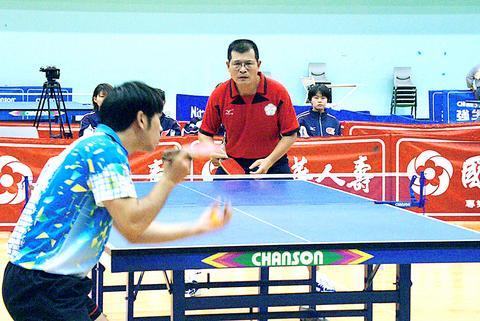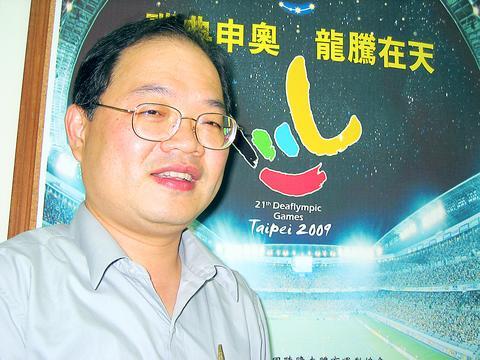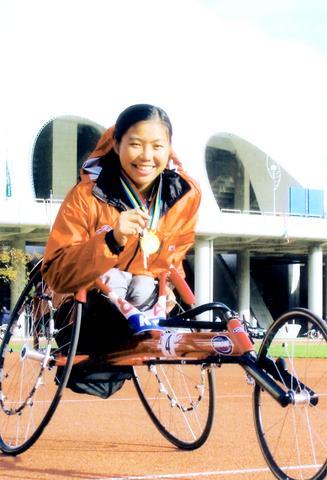While the nation's poor showing on the international sporting scene continues to flummox sports-minded folk, athletics committees could do a lot worse than look at and learn from Taiwan's special needs sports associations that constantly manage to build medal winning teams.
Whether it's a regional table tennis competition, or an international athletics meet, Chinese Taipei's paraplegic, deaf and mentally handicapped athletes rarely come home empty handed.

PHOTO COURTESY OF THE CHINESE TAIPEI SPORTS ASSOCIATION OF THE D
Since 1992 -- the year the International Olympic Committee (IOC) recognized Taiwan's handicapped sports associations -- the Chinese Taipei Sports Association of the Deaf (

PHOTO: GAVIN PHIPPS, TAIPEI TIMES
The most recent of these successes took place at the Special Olympics World Games, which were held in Dublin, Ireland, in August. A 43-member squad brought home 10 gold, 13 silver and 11 bronze medals. The team's strongest fields proved to be bocce, aquatics and bowling.
"We started a special five-stage training program a year before we left for Dublin and it certainly paid off," said James Chang (

PHOTO COURTESY OF CHINESE TAIPEI PARALYMPICS COMMITTEE
However impressive these achievements, maybe they are being overlooked. Not that this has stopped the nation's handicapped sports men and women from building up a reputation as some of the finest physically and mentally impaired athletes in the world. This is a status that, according to Lai Fau-hwan (
"The biggest problem has always been the fact that non-handicapped [Taiwanese] put far too much emphasis on being a hero and winning rather then simply participating," Lai said. "I look at it differently. It's not about winning, it's about physical well-being, enjoyment and involvement."
A graduate of Taiwan Normal University's faculty of Physical Education, Lai lost his left leg in motorcycle accident in 1979. His prosthetic limb didn't stop him becoming one of the nation's first paraplegic gold medal winners.
Lai entered the record books at the 1989 Far East and South Pacific Games for the Disabled (FESPIC) in Kobe, Japan, winning gold in the discus and javelin and silver in the shot putt. On his return to Taiwan, Lai was greeted to a hero's welcome and even honored at a special reception by then president Lee Teng-hui (李登輝).
On taking over as director of the Chinese Taipei Paralympics Committee in 1992, Lai's first task was to secure funding for the cash-strapped organization.
Although government funding was not forthcoming for the first three years of Lai's tenure, in 1995, the government finally caved in and donated NT$10million to the committee for training and education programs and travel expenses.
"It was a real fight to get the funding in the beginning. I don't think the government considered [handicapped] sports worthy of funding," said the committee director. "It's gotten a lot better. Society's opinions about us and what we can achieve, given the right support, has changed for the better."
According to Lai, since President Chen Shui-bian (陳水扁) began his term in office, acquisition of annual funds for the paralympics team has got easier. Instead of an annual budget, funding is based upon the committee's sporting calendar.
Due to its participation in the upcoming Wheelchair Games in Christchurch, New Zealand, in October, this year's budget weighed in at just over NT$20million. With the cash, Lai said he was confident Taiwan's paralympic team would continue to prove its medal winning mettle in track and field events, table tennis and power lifting.
"There might be no fixed annual budget, but the funding we do get is enough and enables us to attend more competitions, which in turn means we are in a constant state of improvement," Lai said.
Receiving slightly less funding -- roughly NT$5million per annum -- the Chinese Taipei Sports Association of the Deaf has also made its mark on the international sporting scene; athletics, aquatics and table-tennis being the three areas in which the associations excels. Deaf athletes are not permitted by IOC rules to participate in sports that involve physical contact such as judo and wrestling for safety reasons.
Deaflympic success might have eluded the team, but after participating in only three Asian Pacific Games for the Deaf since 1996 the Chinese Taipei Sports Association of the Deaf is currently lying second in the overall Asian standings. Its behemoth cross-strait rival China is third with 22 gold medals to Taiwan's 24.
"When you look at the numbers of those eligible to participate in deaf games in China for example, then Taiwan's achievement is fantastic," said Chao Yu-ping (
Along with beating China into second place in the Asian rankings, Taiwan's deaf athletes have also enjoyed the prestige of hosting the Deaflympics. In 2000 the sixth Asian Pacific Games for the Deaf was held in Taipei. The event saw Taiwan placing second to Japan by a margin of only three silver medals.
The association was recently given another boost after Taiwan won the rights to host the 2009 Deaflympics, which will be the first time the event has ever been held in an Asian country since its inception in 1924.
Although Taiwan's handicapped athletes are all amateurs, those athletes chosen to represent their country still take international competition very seriously. Along with its regular coaching sessions, the Chinese Taipei Paralympics Committee has recently taken to using sports psychologists in order to enhance performance. Also, members of the paralympic squad have been visiting the Chinese Culture University's Graduate Institute of Sport Coaching Science (
Wired up to an array of specially adapted exercise machines, faculty members such as Professor Jasson Chiang (
"We have specially adapted machines on which we can plot the handicapped athletes' physiology. With the coaches present we map out a training schedule that best suits each particular individual," said Chiang. "Unlike non-handicapped athletes, each one has his/her restrictions and own needs. We haven't been doing it long and we're still learning, but it's certainly made a difference, especially to the younger athletes."
Regardless of their physical disparities and amateur status, Taiwan's paraplegic, deaf and mentally handicapped teams haven't avoided the irksome shenanigans of Beijing that take place at international sports meets. Old rivalries still run deep, as Taiwan's paralympic team discovered nine years ago.
The slap in the face took place at the 1994 FESPIC Games in Beijing after a stadium announcer at the awards ceremony referred to Taiwan as "China Taipei" as opposed to the officially IOC recognized moniker of Chinese Taipei.
"I told them in no uncertain terms that if they didn't correct the mistake and announce [our] name in accordance with IOC rules that we would boycott the awards ceremony," said the paralympic committee director with a smirk. "Whether it was deliberate or not I don't know. They said it again properly, though and we took to the podium with the other teams."

March 24 to March 30 When Yang Bing-yi (楊秉彝) needed a name for his new cooking oil shop in 1958, he first thought of honoring his previous employer, Heng Tai Fung (恆泰豐). The owner, Wang Yi-fu (王伊夫), had taken care of him over the previous 10 years, shortly after the native of Shanxi Province arrived in Taiwan in 1948 as a penniless 21 year old. His oil supplier was called Din Mei (鼎美), so he simply combined the names. Over the next decade, Yang and his wife Lai Pen-mei (賴盆妹) built up a booming business delivering oil to shops and

The Taipei Times last week reported that the Control Yuan said it had been “left with no choice” but to ask the Constitutional Court to rule on the constitutionality of the central government budget, which left it without a budget. Lost in the outrage over the cuts to defense and to the Constitutional Court were the cuts to the Control Yuan, whose operating budget was slashed by 96 percent. It is unable even to pay its utility bills, and in the press conference it convened on the issue, said that its department directors were paying out of pocket for gasoline

On March 13 President William Lai (賴清德) gave a national security speech noting the 20th year since the passing of China’s Anti-Secession Law (反分裂國家法) in March 2005 that laid the legal groundwork for an invasion of Taiwan. That law, and other subsequent ones, are merely political theater created by the Chinese Communist Party (CCP) to have something to point to so they can claim “we have to do it, it is the law.” The president’s speech was somber and said: “By its actions, China already satisfies the definition of a ‘foreign hostile force’ as provided in the Anti-Infiltration Act, which unlike

Mirror mirror on the wall, what’s the fairest Disney live-action remake of them all? Wait, mirror. Hold on a second. Maybe choosing from the likes of Alice in Wonderland (2010), Mulan (2020) and The Lion King (2019) isn’t such a good idea. Mirror, on second thought, what’s on Netflix? Even the most devoted fans would have to acknowledge that these have not been the most illustrious illustrations of Disney magic. At their best (Pete’s Dragon? Cinderella?) they breathe life into old classics that could use a little updating. At their worst, well, blue Will Smith. Given the rapacious rate of remakes in modern